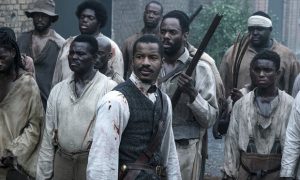(ThyBlackMan.com)
Birth of a Nation is about Nat Turner as an enslaved Baptist preacher who lives on a Virginia plantation owned by Samuel Turner. With rumors of insurrection in the air, a cleric convinces Samuel that Nate should sermonize to other slaves, thereby quelling any notions of an uprising. As Nate witnesses the horrific treatment of his fellow man, he realizes that he can no longer just stand by and preach. On Aug. 21, 1831, Turner’s quest for justice and freedom leads to a violent and historic rebellion in Southampton County.
Nat Turners story is a very complex yet a liberating one. Yes, it is another slave movie. Not just any slave film, but one about continued struggle to takedown an oppressive system. Nate Parker digs into the under belly of this story. He does a damn good job while doing it. With uncomfortable imagery and limited dialogue outside of Nat Turners character quoting scripture; he does a damn good job telling this story. For Birth of a Nation to have had the highest buy  out in Sundance history was a sign that this film was powerful. Reason, case and point as to why this movie could not do well.
out in Sundance history was a sign that this film was powerful. Reason, case and point as to why this movie could not do well.
Nate Parker is not a perfect man, but who is. Not excusing his mistakes or indiscretions however this movie needs to be seen by all. The film goes beyond him and his missteps that he was “acquitted” from and has apologized for. However because he is not graveling at the feet of the oppressors does that make him unapologetic or disconnected from what happened in his life over 15 years ago. Parker was tried, found not guilty and still being persecuted. An unjustly distraction that was used during slavery and as one can see, used today. Nate Parker has played many profound roles leading up to this one as Nat Turner. Why are his indiscretions now being brought up? Because he is on the brink of something great.
The parallels of this film with what is going on today in this nation; anti- black violence during slavery and anti- black violence Amerikka. With the raw and high emotions in the black community, this movie fuels that very same emotion. “They are killing people for no reason but being black” a line from the movie exclaims. Is that not what is going on today? Every day it’s another dead black body that leads to a hashtag. The oppressors isn’t outright hanging black people or dragging them behind their pick-up trucks. But the inequalities of the system are still present.
The black community needs stories about rebellion to remind us that moral appeals and reform movements were not enough to end slavery. As an economic, political, and social institution, slavery gave the oppressors so much powerful leverage over black people. This is something that the black community still has to tug of war with. So we certainly need a film such as this to remind us that there were black people who loved themselves and their community; enough to risk their lives to destroy a corrupt and oppressive system. These are the lessons that The Birth of a Nation gives its audience.
Staff Writer; Amber Ogden
One may also view more of her work over at; AmberOgden.com.
Also connect via Instagram; 1amberogden and Twitter; MsAmberOgden.

















Unfortunately, white film-goers are staying away from this in droves. Nobody likes seeing themselves in a negative light, right? Get over it. It’s not you. But it was America. No need for white guilt. And no need for indignant, self-important, self-righteous umbrage either. Instead, this film provides a good stiff jolt regarding how inequities started and continue to this day, making this a potent wake-up call for rectifying many of today’s inequities. While the film runs about 10-15 minutes too long (a little editing would have helped propel the plot), it nevertheless does an amazing job of showing what plantation life was like in the 1830s. Plus it makes one wonder why there weren’t many more rebellions. Kudos to everyone, especially Nate Parker – who wrote, directed, starred and produced. I am particularly POed by the way the press has cravenly focused on Parker’s past court trial and acquittal instead of upon the achievements of this movie – thus condemning this movie’s chances to succeed by damning the filmmaker. (And no – I’m not championing the fact that he might have been a rapist . . . far from it.) However, it’s easy to see how this negative press coverage before the premiere instead of after it, could definitely smack of yet another form of white elitist racism. See the movie. Decide for yourself. Powerful stuff.
Different audiences will see this movie through different prisms, quite obviously. Some people won’t want to see it at all, for various reasons. Given the inflamed, highly polarized state of affairs across the nation, the Black Lives Matter movement and protests about police treatment of blacks, racial profiling, our national anthem and criminal injustice, the film resonates with a righteous unrest that rings far beyond events that happened 175 years ago.